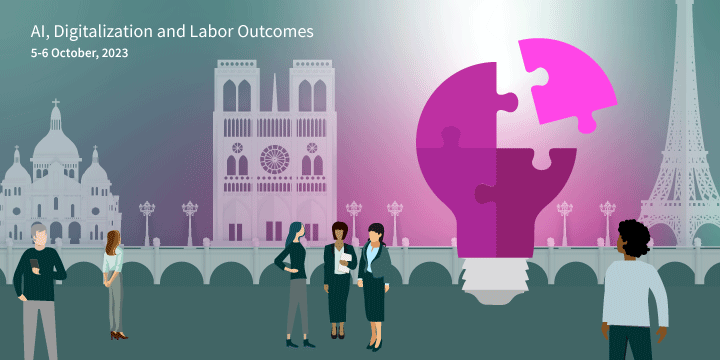Pillars Workshop: Digitization, AI and Labour Outcomes
This workshop brought together top-notch non-Pillars researchers and the excellent members of our own project, where we both disseminated and inseminated our research on Digitization, AI and Outcomes for Labour. This far-reaching research agenda is broad, and therefore, the workshop was organized around a handful of themes, bundled into several focused sessions.

Two sessions were devoted to broad Perspectives. The workshop was kicked off by an inspiring presentation by Donghyun Suh (University of Virginia) of his work with Anton Korinek (one of the leading thinkers on the future impacts of AI on labour, and beyond) on the conditions under which economies may transition to Artificial General Intelligence (AGI), where AI may perform all (human) cognitive tasks. If this happens, two scenarios may ensue. Under the first, returns to labour (and other factors in finite supply) may approach zero. But if the intensity of required computing power to perform a given cognitive task increases fast enough with the complexity of the task, then wages may continue to grow forever. This calls for a better understanding of the theoretical possibilities and limitations of AI. This dovetailed with the presentation of Maria Savona (University of Sussex) on the state of Emerging Digital Technologies, and their potential to affect the Future of Work, and that of Ana Oliveira (UNU-MERIT, U. of Utrecht), who reported on a survey of hundreds of experts from science, technology, business, civil society and policy, that predict which automation technologies will become prevalent by 2030, which tasks they will perform, and what skills they will replace. The fourth perspectives presentation was by Elena Verdolini (University of Brescia), who discussed how the so-called digital transformation may contribute to a just ecological transition.
Two sessions were devoted to Jobs and Skills. Roland Rathelot (ENSAE, Ecole Polytechnique) reported on a large-scale experiment that demonstrated that ability of AI to improve job search and match quality, especially for less-educated workers and the unemployed. Katherine Stapleton (The World Bank) showed how the proliferation of AI in India’s services sector led to a reduction in quantity of job postings and in wage offers for highly skilled managerial and professional occupations, who perform non-routine, analytical and communication tasks. Emilie Rademakers (University of Utrecht) analysed how the chances of finding a new job upon displacement depend on the overlap of tasks in the current (displaced) job with other occupations. Rounding up the discussion on the impact on jobs, James Bessen (Boston University) highlighted the importance of within-occupation heterogeneity in skills, and demonstrates that information technology increases the number of skills demanded per job, conferring wage increases to those who possess these skills, while increasing wage inequality within occupations.
Two sessions were devoted to Labour and Firms. Ariell Reshef (Paris 1, PSE) presented new research showing how digitalization of work within firms caused polarization in non-pecuniary working conditions (and work satisfaction), all the while increasing employment in high-paying jobs. Simon Bunel (Banque de France) showed how firms that invest in modern manufacturing capital, including automation technologies, increased employment more than other firms without affecting within-firm inequality, especially in sectors that are open to international trade. Flavio Calvino (OECD) presented a portrait of AI adopters across countries, demonstrating that these firms are more productive, large, and posses complementary assets such as high-speed digital infrastructure and other digital technologies. Tomasz Michalski (HEC Paris) rounded the discussion of firms with a discussion of the importance of “knowledge workers” for firm capabilities, including technology adoption.
A special session was devoted to International Trade. Christian Volpe Martinicus (IADB) showed how digitalization of customs increased firms’ exports, in a unique empirical setting in Costa Rica. Daniel Trefler (University of Toronto) surprised the audience with a presentation on the magnitude of international trade in digital services, how AI massively accelerated this trend, and on the importance of regulation of data transfer across borders.
One session was devoted to Impacts. Tommaso Ciarli (UNU-MERIT, University of Sussex) presented newly developed measures of industry and occupation exposure to emerging digital automation technologies, and the heterogeneous impacts these had on labour demand. Oliver Falck (ifo, LMU) presented new findings on how automation affects wages, the impact of training in mediating these effects, by leveraging individual-level evidence from Programme for the International Assessment of Adult Competencies (PIAAC).
Photo of some of the presenters, from left to right: Donghyun Suh (University of Virginia), Katherine Stapleton (World Bank), Daniel Trefler (University of Toronto), Ana Oliveira (Utrecht University and UNU-MERIT), Emilie Rademakers (Utrecht University), Tomasz Michalski (HEC Paris), Ariell Reshef (Paris 1 and Paris School of Economics), Maria Savona (University of Sussex SPRU), Tommaso Ciarli (UNU-MERIT and University of Sussex SPRU), Roland Rathelot (ENSAE, Institut Polytechnique de Paris), Simon Bunel (Banque de France), Christian Volpe Martinicus (IADB), Flavio Calvino (OECD)
